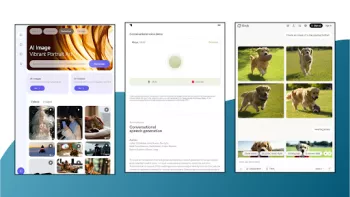Apps Home

The Role of AI in Modern Oceanography
Artificial Intelligence (AI) is revolutionizing the field of oceanography, offering unprecedented capabilities in data collection, analysis, and interpretation. As the vast oceans cover more than 70% of the Earth's surface, understanding their dynamics is crucial not only for the advancement of science but also for addressing global challenges like climate change, pollution, and marine biodiversity loss. AI facilitates these pursuits by leveraging advanced algorithms and machine learning models that can process immense volumes of oceanic data, including satellite imagery, sensor readings, and historical databases. For instance, AI-powered autonomous underwater vehicles (AUVs) and drones are now deployed to explore the ocean depths, gathering crucial data on ocean currents, temperature gradients, and marine life with minimal human intervention. These robotic systems are equipped with sensors and AI algorithms capable of adaptive learning, allowing them to make real-time decisions and optimize their exploration paths, an ability crucial in hostile and unpredictable oceanic environments. Furthermore, AI models are extensively used in simulating oceanic phenomena such as El Niño, aiding climatologists in predicting weather patterns and aiding disaster preparedness. Machine learning techniques, particularly deep learning, have been employed to analyze acoustic signatures, which helps in identifying and tracking marine species, leading to better conservation strategies and policy formulation. AI's application in oceanography doesn't just stop at understanding physical attributes; it's also crucial in socio-economic aspects such as optimizing shipping routes and improving disaster response times. By processing dynamic ocean weather data, AI helps to predict and avoid dangerous conditions, ensuring the safety of maritime navigation. In essence, AI stands as a cornerstone of modern oceanography, turning the once-inaccessible into data-rich labs of discovery.
Innovative AI Tools Driving Marine Exploration
The evolution of AI technologies has brought forth an array of tools that are transforming how scientists explore and study the marine environment. These tools, ranging from AI-driven data analytics platforms to machine learning models, are vital in deciphering the complex interactions within ocean ecosystems. AI systems are now capable of integrating satellite data with in-situ observations to monitor ocean surface temperatures, track oceanic circulations, and detect marine pollution in real-time, contributing significantly to our understanding of ocean health. Additionally, AI is at the forefront of deciphering the genetic codes of marine organisms through bioinformatics. By using AI algorithms to analyze genomic data, researchers can delve into the blueprints of life in the oceans, discovering new species and understanding evolutionary patterns. This capability is particularly powerful in unexplored deep ocean environments where traditional tools fail due to depth and pressure constraints. Moreover, AI-powered simulators allow researchers to recreate and study oceanic conditions, facilitating groundbreaking research in fields like marine biology and ecology. AI-driven simulators model ecosystems to predict the impacts of environmental changes, helping scientists to craft informed conservation strategies. In the context of industry, AI tools are embedded in ocean-based energy systems such as offshore wind farms and tidal energy converters to optimize performance and predict maintenance needs. These tools analyze various data streams to provide actionable insights, reducing operational costs and environmental impacts. On a similar note, AI aids in aquaculture—the breeding and farming of fish—by predicting growth patterns and optimizing feeding schedules, ensuring sustainable marine food supplies. The continuous deployment and innovation of AI tools in marine research not only enhance our empirical understanding but also guide practical applications that balance human progress with ecological preservation.
The Impact of AI on Ocean Conservation Initiatives
AI plays a pivotal role in marine conservation efforts, driving initiatives that protect and sustain marine ecosystems. The application of AI in conservation science primarily involves the monitoring and management of marine protected areas (MPAs) to curb illegal activities that threaten biodiversity. AI-equipped surveillance systems, such as drones and remote sensing satellites, provide high-resolution imagery and real-time data to detect unauthorized fishing and poaching activities across vast ocean stretches. These systems employ computer vision techniques to interpret visual data, significantly reducing human effort and increasing monitoring efficacy. Furthermore, machine learning models generate predictive analytics that forecast the migration patterns of marine species. These insights inform regulatory bodies and aid in establishing conservation policies that align with natural cycles. AI also facilitates citizen science campaigns by processing and analyzing crowd-sourced data from ocean observers and divers, thus broadening the scope of conservation data and community involvement. The initiative "Save Our Oceans," for instance, utilizes AI to manage a global database of coral reefs' health, enabling swift action in response to bleaching events. Another fascinating application of AI is in combating plastic pollution, where AI-powered systems are used to identify, categorize, and predict the movement of plastic debris across ocean currents. This predictive capability is essential in designing strategic cleanup operations and devising policies aimed at reducing plastic inflow into oceans. Moreover, AI-enhanced acoustic monitoring can track marine species' communication, helping researchers understand how noise pollution disrupts natural behaviors and identifying measures to mitigate such impacts. These multi-faceted applications showcase AI's transformative potential in shaping a sustainable future for ocean ecosystems by providing tools that curate insights and guide actions towards preserving ocean health.
The Role of Big Data and AI in Ocean Economy
Big data, coupled with AI, is reshaping the ocean economy by enhancing sustainable practices and unlocking new economic avenues in the blue economy sector. As ocean resources become crucial for global economic development, AI technologies help industries optimize resource extraction and improve operational efficiencies. For instance, AI aids in the sustainable management of fishing industries by analyzing data from satellite trackers, ensuring fish stocks are harvested at sustainable levels and alerting authorities to illegal activities. In renewable energy, AI optimizes the operations of offshore wind farms by predicting weather patterns and equipment performance, which prolongs the lifespan of turbines and maximizes energy throughput. AI's applications extend to shipping industries, where intelligent platforms analyze real-time data to improve routing efficiencies, reduce fuel consumption, and minimize greenhouse gas emissions. These efficiency gains not only lower costs but also align maritime operations with global environmental standards. AI is instrumental in port operations as well, where it manages logistics and supply chains, anticipating demand fluctuations and reducing bottlenecks. Beyond traditional industries, AI fosters innovation by promoting new sectors like marine biotechnology and deep-sea mining, where it accelerates discovery processes and devises ethical extraction practices. Importantly, AI-driven data analytics platforms provide policymakers and stakeholders with comprehensive insights into oceanic economic activities, facilitating informed and sustainable decision-making. Initiatives such as AI for Oceans demonstrate AI's capability to integrate various data sources, transforming raw ocean data into actionable economic insights. As a catalyst for growth, AI in the ocean economy promises a synergy between economic and environmental objectives, curating a balanced approach to leveraging ocean resources responsibly.
Set Sail on Unlimited AI Adventures
The Oceans of AI platform epitomizes the intersection of advanced AI capabilities and oceanic wonders, offering users an unrivaled suite of over 2500 AI tools across various domains. This all-encompassing platform is tailor-made for explorers, researchers, and hobbyists who seek to harness AI's potential in navigating oceanic challenges and unlocking new horizons. Users can effortlessly search for specific AI tools using keywords, making the discovery process intuitive and streamlined. The platform caters to diverse needs, from writing and content creation to SEO optimization, social media management, and art generation, providing ample resources for creative and professional endeavors. Furthermore, the platform is regularly updated with cutting-edge AI tools, ensuring users remain at the forefront of technological advancements. Enhancing user experience, Oceans of AI offers the option to bookmark favorite tools for quick access, allowing for a more efficient workflow. Security remains a top priority, with all activities conducted through the user's default browser without requiring additional permissions or jeopardizing data integrity. For individuals passionate about exploring AI's potential in oceanography and beyond, Oceans of AI not only offers access to a treasure trove of tools but also provides tips and tutorials to maximize utility and inspiration. Embarking on voyages of discovery has never been easier, as the platform's technological canvas extends endless avenues for creativity and exploration, ensuring all adventurers are equipped with the tools needed to thrive in the digital ocean. Whether you're on a quest for innovation or looking to streamline processes, set sail on an odyssey of discovery with the Oceans of AI.
Embark on your own AI adventure by exploring these platforms: Download for Android.
Share Your Opinion
Your Email Will Not Be Published.
All Rights Reserved © Apps Home 2025
















































Mudassir Baig
Perfect app, Add few more categories and also dark mode... I am still exploring it and make making my favorites list...
Ravi Kumar
Best app to learn all types AI contents and materials
Ashfak
Nice app. Contains only Free AI Tools. Thanks
Shuvam Das
Excellent work by devs. Thanks for utmost dedicated work
Javed Khan
Great app, contails lots of categories of AI tools. Thanks